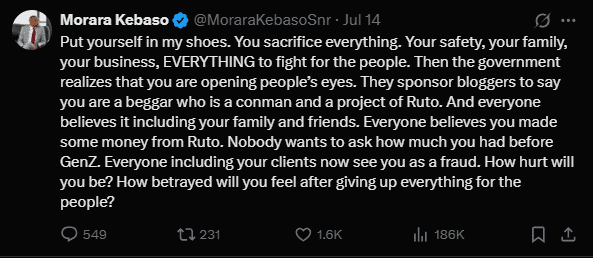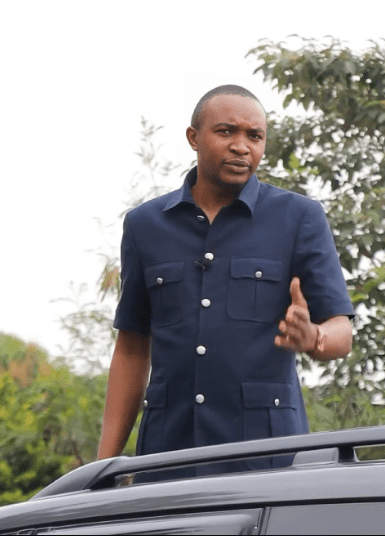The Case of Morara Kebaso
On the afternoon of October 1st, 2024, the self-appointed Registrar of Broken Promises and presenter of Vampire Diaries, Morara Kebaso, triumphantly stormed into the Central Business District flanked by his entourage.
The fast-rising political figure had just been released on a KSh 50,000 cash bail in court following a wave of public outcry over his arrest.
Morara had wiggled through cyber harassment charges after a series of explosive tweets targeting President William Ruto.
Addressing cheering crowds, Morara again tore into the president, calling for his removal from office before the upcoming 2027 elections.
This was the peak of Mr. Kebaso’s charisma, barely three months after the historic storming of Kenya’s Parliament by protesters on June 25.
Alongside a handful of bold young leaders, such as Kasmuel McOure, and a fearless wave of Gen Z activists, Morara had successfully pushed the government into a corner, following years of political stagnation and economic mismanagement.
Backed by the people and with a message that resonated widely, Morara was unstoppable.
His impromptu government project audits filmed for the Vampire Diaries Series struck a nerve with Kenyans frustrated by endemic corruption and mismanagement.
With a razor-sharp legal mind, a gift for satire, and a knack for organizing, Morara came to personify a rare form of politics sustained by authentic grassroots support.

Kenyans on Social Media Turn Against Morara
Riding on rising public momentum, the young entrepreneur solidified his political path by launching the INJECT Party (Inclusive National Justice, Economic and Civic Transformation).
To him, INJECT wasn’t just a party; it was a platform for the sweeping political reset that his fellow Gen Z citizens were demanding.
But fame and notoriety, especially the political kind, is a double-edged sword in Kenya.
Predictably, the very masses that had once crowned him a savior turned against him in a protracted, grueling fallout that unfolded on X.
Within weeks of his political declaration, Morara faced relentless scrutiny. Suspicious fans began dissecting his every move.
Unconfirmed reports of the National Intelligence Service’s involvement in his new political party soon gave way to rumors that he had been co-opted into a “controlled opposition” led by politicians who appeared to challenge the government.
It didn’t take long before online murmurs turned into trending hashtags. Accusations of betrayal, selling out, and opportunism took over the conversation.
Scores of people who had contributed to his civic campaign were now demanding refunds, eyeing his fleet of 4-wheel vehicles and a palatial mansion he had acquired for his political activities.
Morara Taps Out, Quits Politics
On June 23, 2025, Morara abruptly announced he was quitting politics. In an emotional statement, he cited safety concerns, exhaustion, and relentless misrepresentation.
“I have sacrificed my safety, privacy, and even health for people who now seem determined to destroy me,” said Morara in a candid social media post.
Ironically, a few weeks later, Morara rescinded his resignation, saying that leadership is not a choice but a calling.
His political activity, however, appears to have scaled down, with his focus now shifted toward promoting his deluxe furniture business on social media platforms.

Morara’s experience is not isolated. Kenya has a well-known pattern of devouring its reformers.
From civil society actors to young aspirants daring to speak truth to power, the public often tries to shut them down at some point.
Young progressive leaders have, on numerous occasions, been “welcomed” by hardened goons working under the shadowy tactics of legacy politicians desperate to hold onto power.
Kasmuel McOure, once an associate of Kebaso during the renowned Gen Z political uprising, faced intense backlash after aligning himself with the long-standing opposition party, ODM.
He joined the party’s youth wing at a time when ODM had closed ranks with the ruling coalition, a move that opened the door for its senior members to secure ministerial appointments.
Although Kasmuel defended his decision as a pursuit of political mentorship, the broader Gen Z movement branded him a sellout and publicly distanced itself from him.
In response, the eloquent McOure criticized the movement for stifling his personal and political growth.
Some Kenyans tend to project their collective hopes onto individuals, expecting overnight miracles in systems designed to resist change.
The moment these individuals falter or are perceived to compromise, they’re quickly branded traitors and relegated to the fringes of political discourse.
Netizens have also used the ruthless pace of digital politics to perfection.
Social media has shortened public patience and heightened the appetite for drama, where public figures are tried and condemned in real time.

